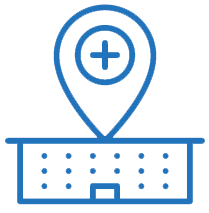Neurology
Mind Your Wellness
Issues affecting the brain and nervous system should be taken seriously. Even less severe neurological conditions can have a profound effect on overall well-being. The Neurology Department at Hammond-Henry Hospital is dedicated to providing expert care for the brain, spinal cord, and nerves with high-quality, specialized services.
What Is Neurology?
Neurology is a branch of medicine focused on any conditions that affect the central nervous system, including the brain, spinal cord, and nerves. This can include numerous medical issues, including:
- Epilepsy
- Parkinson’s disease
- Multiple sclerosis
- Stroke
- Vertigo
- Dementia
- Memory loss
Meet Our Neurologist
Dr. Waseem Ahmad specializes in General Neurology and Sleep Medicine, which includes neurological testing, EEGs (electroencephalograms), EMGs (electromyographies), and the evaluation and treatment of neurological disorders. Dr. Ahmad also performs home sleep studies, clinical Botox injections, and injections for excessive sweating in the palms, feet, and underarms and drooling.
- Education: MD, Allama Iqbal Medical College (Lahore, Pakistan), 1995; Punjab Medical College (Faisalabad, Pakistan), 1996)
- Residency: Neurology, Oklahoma University Health Sciences Center (Oklahoma City, OK), 2003-2006
Dr. Ahmad is accepting new patients, but referrals are necessary to make an appointment. His hours are Monday, Tuesday, and Wednesday by appointment only in the Geneseo Clinic. For more information, call 309.944.9197 or fax 309.946.9275.
When Should I See a Neurologist?
Conditions and illnesses affecting the brain and central nervous system are varied both in terms of symptoms and parts of the body that are affected. Schedule an appointment with a neurologist if you experience any of the following chronic conditions:
- Migraine
- Memory loss
- Dizziness
- Numbness and tingling in the feet
- History of stroke or transient ischemic attack (TIA)
- Parkinson’s disease
- Multiple sclerosis
- Epilepsy
What Neurological Procedures Are Available?
Dr. Ahmad specializes in numerous treatments designed to improve your neurological well-being. Procedures performed at Hammond-Henry include the following:
- Electroencephalograms (EEG): This painless test is used to measure the electrical activity in the brain by attaching electrodes to the scalp.
- Sleep studies: Dr. Ahmad performs home sleep studies to test for disorders like sleep apnea from the comfort of your home.
- Electromyography (EMG) and nerve conduction study: These tests are used to measure muscle and nerve activity. During an EMG, a needle with an electrode is inserted into the muscle and records electrical signals as you move. A nerve conduction study uses electrodes attached to the skin that send small electric pulses into the muscle and measure its response.
- Botox for migraine headaches: Commonly known for cosmetic procedures, Botox has been shown to relieve migraine symptoms by blocking the spastic muscle contractions associated with pain.
- Cervical dystonia treatment: This condition occurs when the muscles in the neck contract, resulting in abnormal twisting and turning of the head. Cervical dystonia can be treated with varying types of injections — including Botox — or surgery.
- Spasticity: With this condition, muscles stiffen and tighten, preventing ordinary movement and locking them into place. Spasticity can be treated with physical or occupational therapy, medications, Botox injections, or surgery.
- Injections for drooling and excessive sweating: Dr. Ahmad also specializes in Botox injections to block the chemical signals to the salivary and sweat glands.
What Should I Expect Before My Appointment?
During your appointment, a neurologist will examine your nervous system and muscular system; a neurological exam may be performed, during which the neurologist will measure your mental status, motor function and reflexes, and sense of touch. Please bring your old labs, MRI images, and an updated medication list with you for the appointment.







